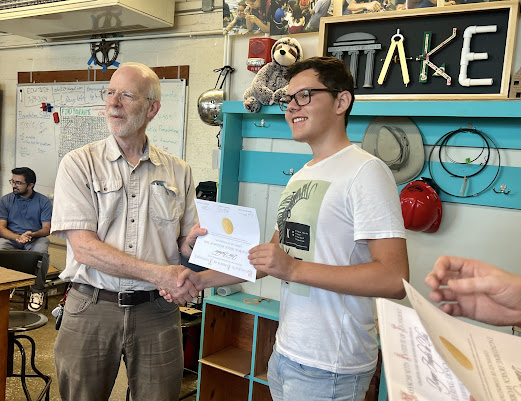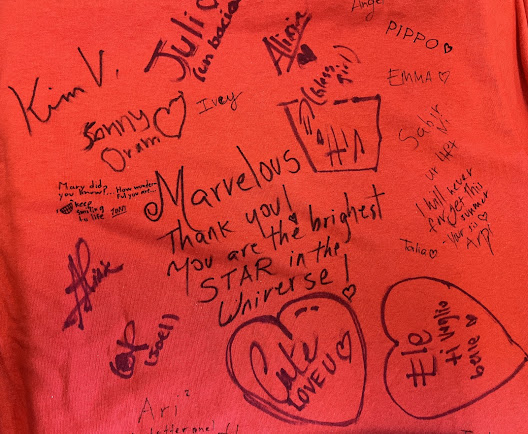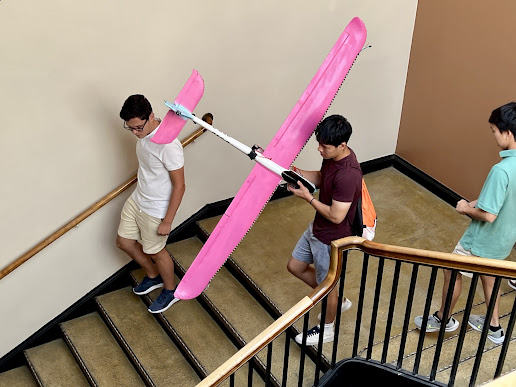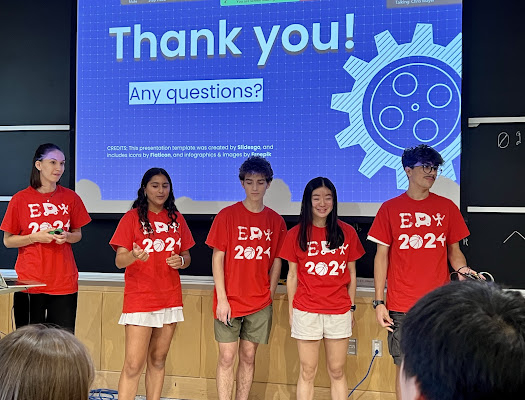Saturday, August 24, 2024
Sunday, August 4, 2024
EDW Cook-a-thon August 2nd
Saturday, August 3, 2024
August 2nd -Discussion and Reflection
EDW 2024- Reflections with Participants and Mentors
- Consider offering optional technical skills seminars/workshops during the program.
- Curate tutorial video resources and online materials for different technical topics.
- Explore possibilities for remote collaboration or future programs between EDW students in different locations.
- Most projects were successful projects with minimal technical issues (some live demos failed, but overall success)
- Autonomy and excitement for building, with a focus on fun (Students chose projects, energy and excitement were high)
- Participants discuss the importance of energy and support in group projects.
- "We don't always know the right answer, but it's okay."
- "Finding the right question is harder than solving it."
- Group projects were unexpectedly enjoyable due to diverse perspectives.
- Communication challenges arose in multinational groups due to language barriers.
- Participants discuss potential collaboration on a remote learning project in Chihuahua, Mexico.
- Ed gave as an example using robotic hands to shake hands virtually, which could be achieved with current technology- see https://www.instructables.com/
Shaking-Hands-Overseas/ project by Joel Garcia - Some team members struggled with connecting ideas and communicating with the team, but eventually became a "wiring master" by the end of the project.
- Group discusses challenges and ideas for improving public transportation.
- The Furrari team regretted not having better tools, such as a better handheld hot wire cutter, for their project.
- More advanced devices are available for cutting precision wing profiles curves.
- Group discusses the importance of having detailed drawings for projects to facilitate help and understanding.
- Drawing is essential for creativity, communication, and problem-solving, according to participants in a workshop. Drawing is the core STEAM skill, connecting engineering, mathematics, art, and science
- Ed recommends learning basic drawing skills for robotics projects, as it can help with perspective drawing and other techniques.
- Chris shared a story about a 3D printing project that didn't work out, highlighting the potential challenges and limitations of using 3D printing in robotics- often there are simpler solutions to a problem.
- 3D printing solution for COVID-19 testing swabs was found through makerspaces and engineering departments at MIT.
- 3D printing can create simple solutions quickly, like a block with three holes for COVID-19 testing swabs.
- Speaker 6 suggests increasing technical sophistication and training in the program.
- Speaker 7 proposes spending more time on imagination and creativity, rather than technical advancements.
- One speaker suggested spending more time on small projects to learn technical skills( see MIT 2.00B), while Speaker 6 prefers more time on final projects to develop independent work habits.
- Ideas for additional seminars or workshops include Microbit training, motor control, and early project development.
- Participants discuss trade-offs between learning skills and completing project time.
- Speaker 5 suggests a workshop to learn about materials and tools (13 people interested)
- Speaker 6 proposed offering short workshops on engineering design and programming (with tutorials on different topics)
- See Tutorials at:
http://www.engineeringdesignworkshop.com/
- Speakers discussed ways to improve the program, including recording videos ahead of time and using Zoom for real-time questions (Speakers 1, 6, and 2).
- Speakers shared their experiences learning skills through hands-on projects and building things, rather than in a classroom setting (Speakers 1 and 2).
- Speaker 1 suggests using short technical projects to teach skills and help with experience.
- Speaker 6 shares a story about a student with advanced theoretical skills but limited practical experience, who built a project without soldering the sensors, resulting in none of them working.
- Groups should takes breaks to bond at various stages in the project, to improve project collaboration.
- Cross-pollination of ideas and serendipity lead to new project ideas.
- Speaker 6 mentions a project with Lisa, where they're trying to expand something globally, and they need help from others.
- Unknown Speaker suggests organizing a hackathon in a city like Boston or Chihuahua, and inviting people to help remotely or travel.
- Participants discuss potential for inter-school collaboration in creative projects.
Mentor Reflections and Student Feedback
Speaker 1 begins by acknowledging the temporary nature of mentorship, noting that while mentors come and go, they always strive to assess what worked and what didn't, aiming for improvement in future engagements. They emphasize the impact of the project on the students, questioning how the experience might influence their future actions, especially when returning to their educational or home environments.
Reflection on the Summer's Highlights
The conversation shifts to a reflection on the summer's experiences, with Speaker 1 prompting the students to share unexpected highlights or pivotal moments. The aim is to gauge the standout experiences that shaped their perspective over the summer.
Project Outcomes and Student Autonomy
As the dialogue progresses, Speaker 1 praises the successful completion of the students' projects, highlighting that unlike previous occasions, this time all projects not only worked but excelled, showing significant improvement and engagement from the students. They discuss the level of autonomy given to students, which was more than expected and differed significantly from traditional classroom settings.
Energy and Excitement About Building
Speaker 4 reflects on the vibrant energy and excitement that permeated the summer, noting that this enthusiasm for building and problem-solving was a notable improvement from previous years. They feel this collective energy greatly contributed to the dynamic learning environment.
Support and Learning Environment
Speaker 6 discusses the supportive learning environment, contrasting it with their usual school experience. They express a desire to bring this supportive culture back to their school in Mexico, emphasizing the positive impact of such an environment on student engagement and learning.
Mentor Knowledge and Student Inquiry
The conversation delves into the mentors' role, with Speaker 1 querying how often mentors felt confident in their answers versus when they were guessing. This leads to a broader discussion about the value of questioning and learning through inquiry, rather than always having the right answers.
International Collaboration and Communication Challenges
The discussion addresses the challenges and enrichments of working in multinational teams, exploring how different perspectives and language barriers impacted the projects. Students share their experiences of overcoming these challenges and how they enriched the collaborative process.
Reflections on Tools and Methods
Towards the end, there's a focus on the technical and practical aspects of the projects, with students and mentors discussing the tools and methods that were most effective or could be improved. This includes suggestions for better preparation and resource utilization for future projects.
Closing Thoughts and Future Engagement
Speaker 1 concludes the session by encouraging ongoing feedback and reflections on how the program could be further enhanced. They express gratitude for the students' contributions and the vibrant community that has formed as a result of their collective efforts.
This edited version of the conversation provides a structured and detailed reflection on the experiences, outcomes, and future directions of the summer program, emphasizing both the achievements and areas for improvement.
Thursday, August 1, 2024
August 1st:Presentations!
Last minute presentation practice!
Discussions!
Last minute testing:
Off to 4-240:
Catawawa!
Waforte!
Team Furrari!
Team Maca!
The Right Boys:
Here's the links to the final presentations:- Katawawa (Basketball Shooter)
- MACA (Dancing Robot)
- Wright Boys (Plane)
- Waforte (Fountain)
- Furrari (Cat Car)
Ed Moriarty describes the beginnings of the EDW program:
Introduction and panel discussion:
Cooper: What I really liked about this program was how free-form and open it was. I was given suggestions on how to do things, but we, the students, got to make a lot of decisions. We had guidance, but it wasn't constricting. It was very open, and I learned a lot. I just want to say that I loved the community we built; everyone was helping each other, like a little community.
Rer: It was very inviting. Everyone had a lot of experience, and the mentors and teachers were helpful when you asked questions. I liked that creativity was one of the most important things here. In real life, society doesn't always value creativity, but here, you can brainstorm and come up with projects that may seem crazy but aren't stupid.
Marvelin-always in style!
Wednesday, July 31, 2024
July 31st- Finishing touches; Visitors from INFN; work on presentations
Team Furrari:
Visiting Professors from INFN: National Institute for Nuclear Physics
Team Maca:
Team Waforte:
Making Commemorative shirts:
Italian Physics professors from INFN do balloon pops in the strobe lab:
The Right Boys- Chris gives feedback on presentation:
Mentor Meeting:
-
Project 1: Learning Names: Learning the names of everyone in the group- forming a community- "the place where everybody knows your nam...
-
EDW students and mentors collaborate in another kind of maker project, cooking dishes from their homelands Instagram Reel: https://www.inst...









































































